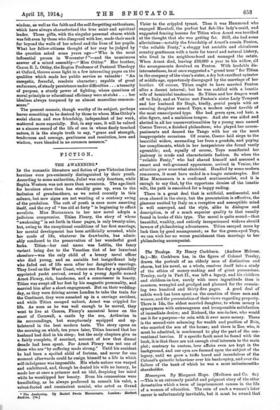FICTION.
THE AWAKENING.*
Ice the romantic literature and fiction of pre-Victorian times heroines were pre-eminently distinguished by their youth. According to some authorities, Juliet was only fourteen, while Sophia Western was not more than seventeen. The age-limit for heroines since then has steadily gone up, even to the inclusion of grandmothers, as we noted recently in this column, but now signs are not wanting of a contrary swing of the pendulum. The cult of youth is once more asserting itself, and the cry of " too old at forty " is beginning to affect novelists. Miss Macnamara in her new novel adopts a judicious compromise. Titian Fleury, the story of whose "awakening" is set forth in these pages, is only twenty-nine, but, owing to the exceptional conditions of her first marriage, her mental development has been artificially arrested, while her mode of life, whatever its drawbacks, has admir- ably conduced to the preservation of her wonderful good looks. Titian—her real name was Letitia, the fancy variant being due to the Venetian tint of her luxuriant ehevelure—was the only child of a breezy naval officer who died young, and an amiable but insignificant lady who faded out of life soon after her daughter's marriage. They lived on the West Coast, where one fine day a splendidly appointed yacht arrived, owned by a young Apollo named Arnot Fleury, rich, handsome, and a connoisseur in beauty. Titian was swept off her feet by his magnetic personality, and married him after a short engagement. But on their wedding- day, as they were driving across London to take the train for the Continent, they were smashed up in a carriage accident, and while Titian escaped unhurt, Arnot was crippled for life. As soon as he was well enough to be moved, they went to live at Camus, Plenty's ancestral home on the coast of Cornwall, a castle by the sea, Arthurian in its surroundings, but sumptuously equipped and up- holstered in the best modern taste. The story opens on the morning on which, ten years later, Titian learned that her husband had died in his sleep; but the early chapters give us a fairly complete, if succinct, account of how that dismal decade had been spent. For Arnot Fleury was not one of those who are "by suffering made strong." Until his accident he had been a spoiled child of fortune, and never for one moment afterwards could he resign himself to a life in which self-indulgence was impossible. His whole nature was warped and embittered, and though be denied his wife no luxury, he made her at once a prisoner and an idol, despising her mind while he worshipped her beauty. Even his concessions were humiliating, as he always preferred to consult his valet, a velvet-footed and omniscient menial, who acted as Grand • The Awakening. By Rachel Bwete Msetutmare. London: Herbert Jeanine. Om] Vizier to the crippled tyrant. Thus it was Hammond who engaged Marshall, the perfect but fish-like lady's-maid, and suggested fencing lessons for Titian when Arnot was terrified at the thought that she was getting fat. Still, she had some alleviations—notably the friendship of Aruot'a cousin Fenton, "the reliable Fenty," a shaggy but amiable and chivalrous country gentleman with a taste for travel and natural history, who lived in the neighbourhood and managed the estate. When Arnot died, leaving £10,000 a year to his widow, all the arrangements devolved on Fenton. With laudable dis- interestedness, he at once suggested a " grand tour " for Titian in the company of the vicar's sister, a dry but excellent spinster of middle age, opportunely disengaged by the marriage of her brother. Of course, Titian ought to have married Fenton after a decent interval; but he was saddled with it lunatic wife of homicidal tendencies. So Titian and her dragon went off to Italy, and at Venice met Fenton's sister Lady Tempest and her husband Sir Hugh, kindly, genial people with an amazing daughter named Toye, a modern enfant terrible of the most emancipated type. She had green eyes, red hair, a slim figure, and a malicious tongue. And she was aided and abetted in all her unconventionalities by a young man named Cosmo Trevor, a finished philanderer, who played her accom- paniments and danced the Tango with her on the most inappropriate occasions. Of course, Cosmo laid siege to the beautiful widow, serenading her from a gondola, and paying her compliments, which in her inexperience she found vastly agreeable; and, equally of course, Toye manifested her jealousy in crude and characteristic fashion. So when the "reliable Fenty," who had shaved himself and assumed a smart and well-groomed appearance, arrived in Venice, the situation grew somewhat electrical. Handled by some modern romancers, it mast have ended in a tragic catastrophe. But Miss Macnamara is a confirmed sentimentalist, and it is enough to say that, by the opportune demise of the lunatic wife, the path is smoothed for a happy ending.
There is a great deal that is artificial, sentimental, and even absurd in the story, but the presentation is effective, the glamour excited by Italy on a receptive and susceptible mind is well conveyed, and the style, alike in dialogue and description, is of a much superior quality to that usually found in books of this type. The moral is quite sound—that beautiful, wealthy, and entirely inexperienced widows should beware of philandering adventurers. Titian escaped more by luck than by good management; as for the green-eyed Toye, we can wish her no worse punishment than marriage to her philandering accompanist.










































 Previous page
Previous page